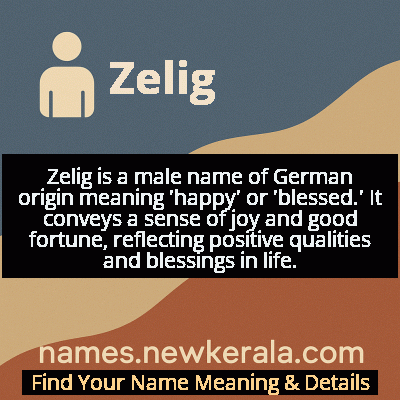Zelig Name Meaning & Details
Origin, Popularity, Numerology Analysis & Name Meaning of Zelig
Discover the origin, meaning, and cultural significance of the name ZELIG. Delve into its historical roots and explore the lasting impact it has had on communities and traditions.
Name
Zelig
Gender
Male
Origin
German
Lucky Number
5
Meaning of the Name - Zelig
Zelig is a male name of German origin meaning 'happy' or 'blessed.' It conveys a sense of joy and good fortune, reflecting positive qualities and blessings in life.
Zelig - Complete Numerology Analysis
Your Numerology Number
Based on Pythagorean Numerology System
Ruling Planet
Mercury
Positive Nature
Adventurous, dynamic, curious, and social.
Negative Traits
Restless, impatient, inconsistent, prone to indulgence.
Lucky Colours
Green, white.
Lucky Days
Wednesday.
Lucky Stones
Emerald.
Harmony Numbers
1, 3, 9.
Best Suited Professions
Sales, marketing, travel, entertainment.
What People Like About You
Versatility, charisma, adventurous spirit.
Famous People Named Zelig
Zelig Kalmanovich
Philologist and scholar
Prominent Yiddish linguist and cultural historian who documented Jewish life in Eastern Europe
Zelig S. Harris
Linguist
Influential American linguist who developed transformational grammar and distributional linguistics
Zelig Mogulescu
Theater director and actor
Pioneering Yiddish theater director and comedian in New York's Lower East Side
Name Variations & International Equivalents
Click on blue names to explore their detailed meanings. Gray names with will be available soon.
Cultural & Historical Significance
The name's cultural significance extends beyond its literal meaning, representing the resilience and cultural preservation of Jewish communities who maintained their linguistic and naming traditions despite various historical challenges and migrations. Zelig embodies the experience of Ashkenazi Jews who navigated multiple cultural influences while preserving their distinct identity. The name also reflects the intellectual and scholarly traditions of German-Jewish culture, often associated with individuals engaged in religious study, linguistic work, or cultural preservation. In contemporary contexts, Zelig serves as a bridge between traditional Jewish naming practices and modern sensibilities, maintaining its cultural resonance while adapting to contemporary naming trends.
Extended Personality Analysis
Individuals named Zelig are often perceived as intellectually curious, emotionally sensitive, and possessing a deep appreciation for knowledge and tradition. They tend to be thoughtful observers with a strong moral compass and a natural inclination toward scholarly pursuits. The name suggests someone who is both grounded in their cultural heritage and open to new ideas, often displaying a unique blend of traditional values and progressive thinking. Zelig's typically exhibit strong communication skills and a diplomatic nature, making them effective mediators and community builders.
Their inherent optimism and resilience, suggested by the name's meaning of 'happy' or 'blessed,' often help them navigate challenges with grace and maintain positive relationships with those around them. They are frequently seen as pillars of their communities, valued for their wisdom and emotional intelligence. The name also implies a certain adaptability and chameleon-like quality, allowing Zeligs to connect with diverse groups while maintaining their core identity. This combination of intellectual depth, emotional awareness, and social flexibility makes them particularly effective in roles requiring cultural sensitivity, education, or community leadership. Their personality often reflects the historical journey of the name itself - maintaining tradition while embracing change.
Modern Usage & Popularity
In contemporary times, Zelig has experienced a modest revival, particularly among Jewish families seeking to honor their cultural heritage. While it remains relatively uncommon in mainstream naming trends, it has gained some popularity in artistic and intellectual circles. The name is increasingly chosen by parents looking for distinctive yet meaningful names with historical depth. In Germany and among German-speaking communities, the variant 'Selig' is occasionally used, though both forms remain rare. The name's association with Woody Allen's 1983 film has given it some cultural recognition beyond Jewish communities, though this has not significantly impacted its usage statistics. Current naming databases show Zelig appearing primarily in North America, Israel, and Western Europe, with occasional use in South America and Australia among diaspora communities. The name maintains its strongest presence in traditional Jewish communities while gradually gaining appeal among non-Jewish parents attracted to its unique sound and positive meaning.
Symbolic & Spiritual Meanings
Symbolically, Zelig represents adaptability, cultural continuity, and the blessing of existence. The name embodies the concept of finding happiness and contentment through connection to one's roots and community. It symbolizes the ability to maintain one's identity while navigating different cultural contexts, much like the historical experience of Jewish diaspora communities. Metaphorically, Zelig suggests the idea of being 'blessed with awareness' - carrying the wisdom of tradition while embracing the present. The name also represents resilience, as it has survived through generations despite historical challenges faced by the communities that favored it. In a broader sense, Zelig symbolizes the human capacity for finding joy and meaning through intellectual curiosity and emotional depth, serving as a reminder that true happiness often comes from understanding one's place in the continuum of history and culture.

